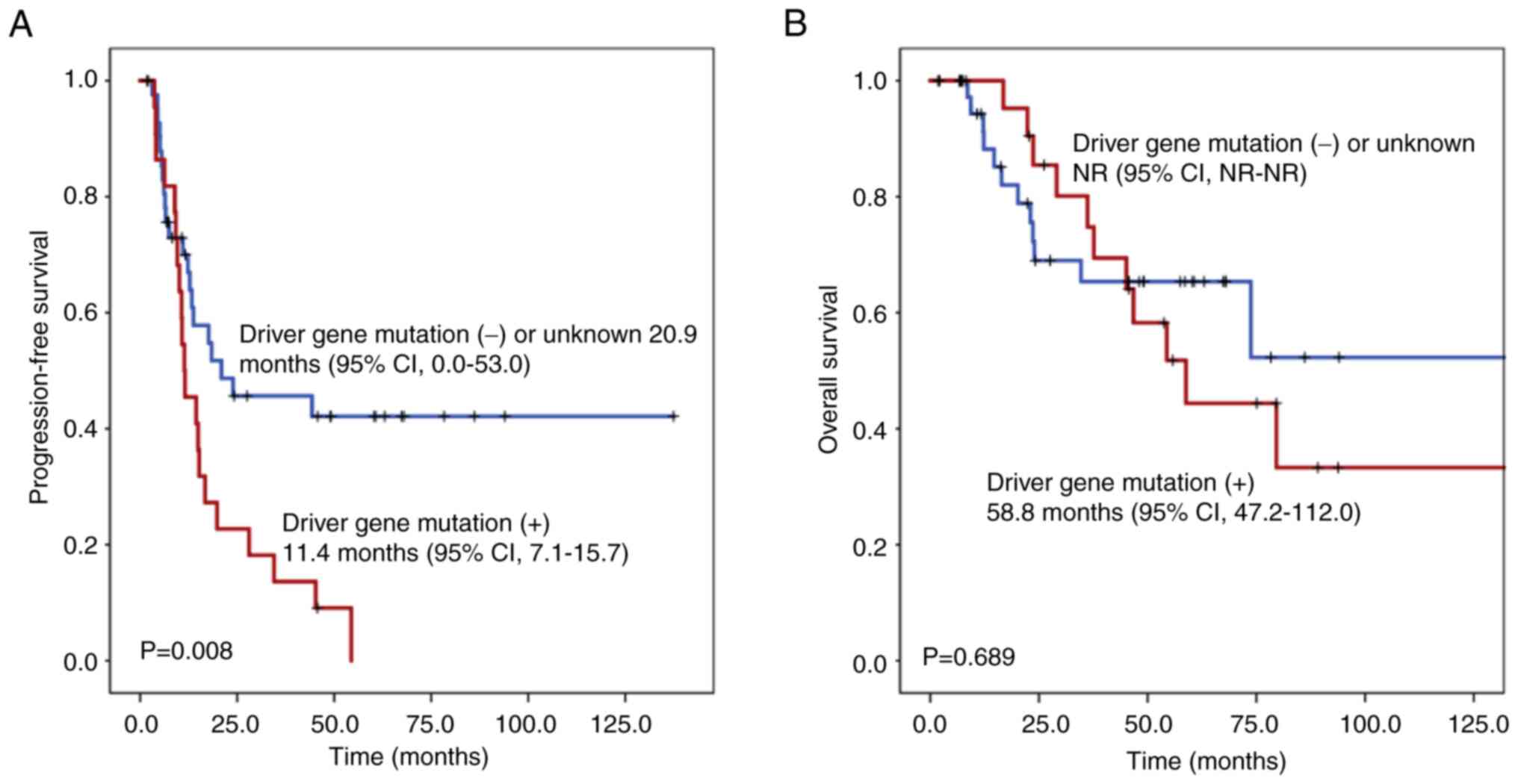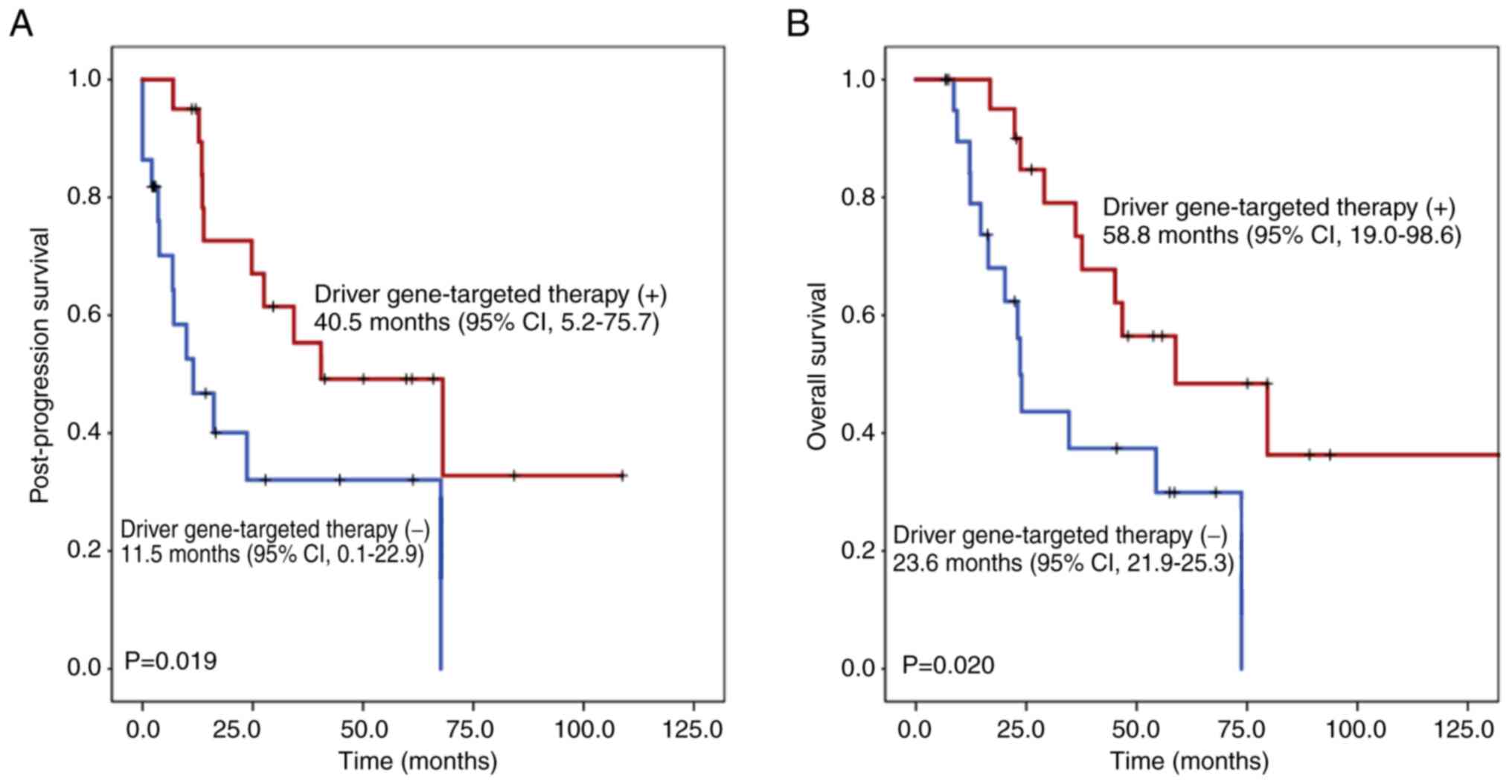|
1
|
Bray F, Laversanne M, Sung H, Ferlay J,
Siegel RL, Soerjomataram I and Jemal A: Global cancer statistics
2022: GLOBOCAN estimates of incidence and mortality worldwide for
36 cancers in 185 counteries. CA Cancer J Clin. 74:229–263. 2024.
View Article : Google Scholar : PubMed/NCBI
|
|
2
|
Chang YJ, Huang JY, Lin CH and Wang BY:
Survival and Treatment of Lung Cancer in Taiwan between 2010 and
2016. J Clin Med. 10:46752021. View Article : Google Scholar : PubMed/NCBI
|
|
3
|
Detterbeck FC: The eighth edition TNM
stage classification for lung cancer: What does it mean on main
street? J Thorac Cardiovasc Surg. 155:356–359. 2018. View Article : Google Scholar : PubMed/NCBI
|
|
4
|
Yang SR, Schultheis AM, Yu H, Mandelker D,
Ladanyi M and Buttner R: Precision medicine in non-small cell lung
cancer: Current applications and future directions. Semin Cancer
Biol. 84:184–198. 2022. View Article : Google Scholar : PubMed/NCBI
|
|
5
|
NCCN Clinical Practice Guidelines in
Oncology, . Non-Small Cell Lung Cancer. Version 8.2024. August
23–2024
|
|
6
|
Carnio S, Novello S, Papotti M, Loiacono M
and Scagliotti GV: Prognostic and predictive biomarkers in early
stage non-small cell lung cancer: Tumor based approaches including
gene signatures. Transl Lung Cancer Res. 2:372–381. 2013.PubMed/NCBI
|
|
7
|
NSCLC Meta-analysis Collaborative Group, :
Preoperative chemotherapy for non-small-cell lung cancer: A
systematic review and meta-analysis of individual participant data.
Lancet. 383:1561–1571. 2014. View Article : Google Scholar : PubMed/NCBI
|
|
8
|
Pignon JP, Tribodet H, Scagliotti GV,
Douillard JY, Shepherd FA, Stephens RJ, Dunant A, Torri V, Rosell
R, Seymour L, et al: Lung adjuvant cisplatin evaluation: A pooled
analysis by the LACE Collaborative Group. J Clin Oncol.
26:3552–3559. 2008. View Article : Google Scholar : PubMed/NCBI
|
|
9
|
Solomon BJ, Ahn JS, Dziadziuszko R,
Barlesi F, Nishio M, Lee DH, Lee JS, Zhong WZ, Horinouchi H, Mao W,
et al: LBA2 ALINA: Efficacy and safety of adjuvant alectinib versus
chemotherapy in patients with early-stage ALK+ non-small cell lung
cancer (NSCLC). Annals of Oncology. 34:S1295–S1296. 2023.
View Article : Google Scholar
|
|
10
|
Ni Y, Lei J, Huang W, Wang J, Guo H, Lv F,
Kang S, Lan K and Jiang T: Systematic review of the perioperative
immunotherapy in patients with non-small cell lung cancer: evidence
mapping and synthesis. Front Oncol. 13:10926632023. View Article : Google Scholar : PubMed/NCBI
|
|
11
|
Tsuboi M, Herbst RS, John T, Kato T, Majem
M, Grohé C, Wang J, Goldman JW, Lu S, Su WC, et al: Overall
survival with osimertinib in resected EGFR-Mutated NSCLC. N Engl J
Med. 389:137–147. 2023. View Article : Google Scholar : PubMed/NCBI
|
|
12
|
Edwards JG, Chansky K, Van Schil P,
Nicholson AG, Boubia S, Brambilla E, Donington J, Galateau-Sallé F,
Hoffmann H, Infante M, et al: The IASLC lung cancer staging
project: analysis of resection margin status and proposals for
residual tumor descriptors for non-small cell lung cancer. J Thorac
Oncol. 15:344–359. 2020. View Article : Google Scholar : PubMed/NCBI
|
|
13
|
Rasing MJA, Peters M, Moreno AC, Hofman
EFN, Herder GJM, Welvaart PWN, Schramel FMNH, Lodeweges JE, Lin SH,
Verhoeff JJC and van Rossum PSN: Predicting incomplete resection in
non-small cell lung cancer preoperatively: A validated nomogram.
Ann Thorac Surg. 111:1052–1058. 2021. View Article : Google Scholar : PubMed/NCBI
|
|
14
|
Remon J, Soria JC and Peters S; ESMO
Guidelines Committee. Electronic address, : Early and locally
advanced non-small-cell lung cancer: An update of the ESMO Clinical
Practice Guidelines focusing on diagnosis, staging, systemic and
local therapy. Ann Oncol. 32:1637–1642. 2021. View Article : Google Scholar : PubMed/NCBI
|
|
15
|
Amin MB, Gress DM and Vega LR: AJCC Cancer
Staging Manual. 8th edition. Springer; Heidelberg: 2018
|
|
16
|
Ou WF, Liao PY, Hsu YW, Huang YH, Hsu KH,
Tseng JS, Chang GC and Yang TY: Outcome of thromboembolic events
and its influence on survival time of advanced NSCLC patients
treated with antiangiogenic therapy. Cancer Manag Res.
15:1251–1262. 2023. View Article : Google Scholar : PubMed/NCBI
|
|
17
|
Hsu KH, Ho CC, Hsia TC, Tseng JS, Su KY,
Wu MF, Chiu KL, Yang TY, Chen KC, Ooi H, et al: Identification of
five driver gene mutations in patients with treatment-naive lung
adenocarcinoma in Taiwan. PLoS One. 10:e01208522015. View Article : Google Scholar : PubMed/NCBI
|
|
18
|
Su KY, Kao JT, Ho BC, Chen HY, Chang GC,
Ho CC and Yu SL: Implementation and Quality Control of Lung Cancer
EGFR Genetic Testing by MALDI-TOF Mass Spectrometry in Taiwan
Clinical Practice. Sci Rep. 6:309442016. View Article : Google Scholar : PubMed/NCBI
|
|
19
|
Su KY, Chen HY, Li KC, Kuo ML, Yang JC,
Chan WK, Ho BC, Chang GC, Shih JY, Yu SL and Yang PC: Pretreatment
epidermal growth factor receptor (EGFR) T790M mutation predicts
shorter EGFR tyrosine kinase inhibitor response duration in
patients with non-small-cell lung cancer. J Clin Oncol. 30:433–440.
2012. View Article : Google Scholar : PubMed/NCBI
|
|
20
|
Tseng JS, Yang TY, Tsai CR, Chen KC, Hsu
KH, Tsai MH, Yu SL, Su KY, Chen JJ and Chang GC: Dynamic plasma
EGFR mutation status as a predictor of EGFR-TKI efficacy in
patients with EGFR-mutant lung adenocarcinoma. J Thorac Oncol.
10:603–610. 2015. View Article : Google Scholar : PubMed/NCBI
|
|
21
|
Mescam-Mancini L, Lantuéjoul S,
Moro-Sibilot D, Rouquette I, Souquet PJ, Audigier-Valette C,
Sabourin JC, Decroisette C, Sakhri L, Brambilla E and McLeer-Florin
A: On the relevance of a testing algorithm for the detection of
ROS1-rearranged lung adenocarcinomas. Lung Cancer. 83:168–173.
2014. View Article : Google Scholar : PubMed/NCBI
|
|
22
|
Hendriks LE, Kerr KM, Menis J, Mok TS,
Nestle U, Passaro A, Peters S, Planchard D, Smit EF, Solomon BJ, et
al: Oncogene-addicted metastatic non-small-cell lung cancer: ESMO
Clinical Practice Guideline for diagnosis, treatment and follow-up.
Ann Oncol. 34:339–357. 2023. View Article : Google Scholar : PubMed/NCBI
|
|
23
|
Hendriks LE, Kerr KM, Menis J, Mok TS,
Nestle U, Passaro A, Peters S, Planchard D, Smit EF, Solomon BJ, et
al: Non-oncogene-addicted metastatic non-small-cell lung cancer:
ESMO Clinical Practice Guideline for diagnosis, treatment and
follow-up. Ann Oncol. 34:358–376. 2023. View Article : Google Scholar : PubMed/NCBI
|
|
24
|
de Koning HJ, van der Aalst CM, de Jong
PA, Scholten ET, Nackaerts K, Heuvelmans MA, Lammers JJ, Weenink C,
Yousaf-Khan U, Horeweg N, et al: Reduced Lung-Cancer Mortality with
Volume CT Screening in a Randomized Trial. N Engl J Med.
382:503–513. 2020. View Article : Google Scholar : PubMed/NCBI
|
|
25
|
National Lung Screening Trial Research
Team, . Church TR, Black WC, Aberle DR, Berg CD, Clingan KL, Duan
F, Fagerstrom RM, Gareen IF, Gierada DS, et al: Results of initial
low-dose computed tomographic screening for lung cancer. N Engl J
Med. 368:1980–1991. 2013. View Article : Google Scholar : PubMed/NCBI
|
|
26
|
Yang CY, Lin YT, Lin LJ, Chang YH, Chen
HY, Wang YP, Shih JY, Yu CJ and Yang PC: Stage shift improves lung
cancer survival: real-world evidence. J Thorac Oncol. 18:47–56.
2023. View Article : Google Scholar : PubMed/NCBI
|
|
27
|
Osarogiagbon RU, Lin CC, Smeltzer MP and
Jemal A: Prevalence, prognostic implications, and survival
modulators of incompletely resected non-small cell lung cancer in
the U.S. National Cancer Data Base. J Thorac Oncol. 11:e5–e16.
2016. View Article : Google Scholar : PubMed/NCBI
|
|
28
|
Rasing MJA, Peters M, Aarts MJ, Herder
GJM, van Lindert ASR, Schramel FMNH, van der Meer FS, Verhoeff JJC
and van Rossum PSN: Adjuvant treatment following irradical
resection of stage I–III Non-small cell lung cancer: A
population-based study. Curr Probl Cancer. 46:1007842022.
View Article : Google Scholar : PubMed/NCBI
|
|
29
|
Park J, Song SY, Kim SS, Kim SW, Kim WS,
Park SI, Kim DK, Kim YH, Park J, Lee SW, et al: Postoperative
radiation therapy following the incomplete resection of a non-small
cell lung cancer. Radiat Oncol J. 32:70–76. 2014. View Article : Google Scholar : PubMed/NCBI
|
|
30
|
Ito M, Miyata Y, Kushitani K, Ueda D,
Takeshima Y and Okada M: Distribution and prognostic impact of EGFR
and KRAS mutations according to histological subtype and tumor
invasion status in pTis-3N0M0 lung adenocarcinoma. BMC Cancer.
23:2482023. View Article : Google Scholar : PubMed/NCBI
|
|
31
|
Park HK, Choi YD, Yun JS, Song SY, Na KJ,
Yoon JY, Yoon CS, Oh HJ, Kim YC and Oh IJ: Genetic alterations and
risk factors for recurrence in patients with non-small cell lung
cancer who underwent complete surgical resection. Cancers (Basel).
15:56792023. View Article : Google Scholar : PubMed/NCBI
|
|
32
|
Fujibayashi Y, Tane S, Kitazume M, Kuroda
S, Kimura K, Kitamura Y and Nishio W: Resected stage I anaplastic
lymphoma kinase-positive lung adenocarcinoma has a negative impact
on recurrence-free survival. Thorac Cancer. 13:1109–1116. 2022.
View Article : Google Scholar : PubMed/NCBI
|
|
33
|
Shin SH, Lee H, Jeong BH, Choi YS, Shin
MH, Kim S, Han J, Lee KS, Shim YM, Kwon OJ and Kim H: Anaplastic
lymphoma kinase rearrangement in surgically resected stage IA lung
adenocarcinoma. J Thorac Dis. 10:3460–3467. 2018. View Article : Google Scholar : PubMed/NCBI
|
|
34
|
Kato S, Goodman A, Walavalkar V,
Barkauskas DA, Sharabi A and Kurzrock R: Hyperprogressors after
immunotherapy: Analysis of genomic alterations associated with
accelerated growth rate. Clin Cancer Res. 23:4242–4250. 2017.
View Article : Google Scholar : PubMed/NCBI
|
|
35
|
Kris MG, Johnson BE, Berry LD, Kwiatkowski
DJ, Iafrate AJ, Wistuba II, Varella-Garcia M, Franklin WA, Aronson
SL, Su PF, et al: Using multiplexed assays of oncogenic drivers in
lung cancers to select targeted drugs. JAMA. 311:1998–2006. 2014.
View Article : Google Scholar : PubMed/NCBI
|
|
36
|
Expert Consensus Panel, . Kidane B, Bott
M, Spicer J, Backhus L, Chaft J, Chudgar N, Colson Y, D'Amico TA,
David E, et al: The American Association for Thoracic Surgery
(AATS) 2023 Expert Consensus Document: Staging and
multidisciplinary management of patients with early-stage non-small
cell lung cancer. J Thorac Cardiovasc Surg. 166:637–654. 2023.
View Article : Google Scholar : PubMed/NCBI
|
|
37
|
Udelsman BV and Blasberg JD: Advances in
Surgical Techniques for Lung Cancer. Hematol Oncol Clin North Am.
37:489–497. 2023. View Article : Google Scholar : PubMed/NCBI
|
















